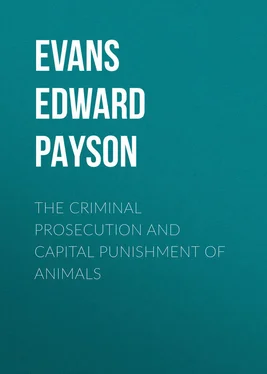Edward Evans - The Criminal Prosecution and Capital Punishment of Animals
Здесь есть возможность читать онлайн «Edward Evans - The Criminal Prosecution and Capital Punishment of Animals» — ознакомительный отрывок электронной книги совершенно бесплатно, а после прочтения отрывка купить полную версию. В некоторых случаях можно слушать аудио, скачать через торрент в формате fb2 и присутствует краткое содержание. Жанр: foreign_antique, foreign_prose, на английском языке. Описание произведения, (предисловие) а так же отзывы посетителей доступны на портале библиотеки ЛибКат.
- Название:The Criminal Prosecution and Capital Punishment of Animals
- Автор:
- Жанр:
- Год:неизвестен
- ISBN:нет данных
- Рейтинг книги:5 / 5. Голосов: 1
-
Избранное:Добавить в избранное
- Отзывы:
-
Ваша оценка:
- 100
- 1
- 2
- 3
- 4
- 5
The Criminal Prosecution and Capital Punishment of Animals: краткое содержание, описание и аннотация
Предлагаем к чтению аннотацию, описание, краткое содержание или предисловие (зависит от того, что написал сам автор книги «The Criminal Prosecution and Capital Punishment of Animals»). Если вы не нашли необходимую информацию о книге — напишите в комментариях, мы постараемся отыскать её.
The Criminal Prosecution and Capital Punishment of Animals — читать онлайн ознакомительный отрывок
Ниже представлен текст книги, разбитый по страницам. Система сохранения места последней прочитанной страницы, позволяет с удобством читать онлайн бесплатно книгу «The Criminal Prosecution and Capital Punishment of Animals», без необходимости каждый раз заново искать на чём Вы остановились. Поставьте закладку, и сможете в любой момент перейти на страницу, на которой закончили чтение.
Интервал:
Закладка:
In the legal proceedings just described, two points are presented with great clearness and seem to be accepted as incontestable: first, the right of the insects to adequate means of subsistence suited to their nature. This right was recognized by both parties; even the prosecution did not deny it, but only maintained that they must not trespass cultivated fields and destroy the fruits of man’s labour. The complainants were perfectly willing to assign to the weevils an uncultivated tract of ground, where they could feed upon such natural products of the soil as were not due to human toil and tillage. Secondly, no one appears to have doubted for a moment that the Church could, by virtue of its anathema, compel these creatures to stop their ravages and cause them to go from one place to another. Indeed, a firm faith in the existence of this power was the pivot on which the whole procedure turned, and without it, the trial would have been a dismal farce in the eyes of all who took part in it.
It is related in the chronicles of an ancient abbey ( Le Père Rochex: Gloire de l’Abbaye et Vallée de la Novalaise ), that St. Eldrad commanded the snakes, which infested the environs of a priory in the valley of Briançon, to depart, and, taking a staff in his hand, conducted them to a desert place and shut them up in a cave, where they all miserably perished. Perhaps the serpent, which suffered Satan to take possession of its seductive form and thus played such a fatal part in effecting the fall of man and in introducing sin into the world, may have been regarded as completely out of the pale and protection of law, and as having no rights which an ecclesiastical excommunicator or a wonder-working saint would be bound to respect. As a rule, however, such an arbitrary abuse of miraculous power to the injury or destruction of God’s creatures was considered illegal and unjustifiable, although irascible anchorites and other holy men under strong provocation often gave way to it. Mediæval jurists frowned upon summary measures of this sort, just as modern lawyers condemn the practice of lynch-law as mobbish and essentially seditious, and only to be excused as a sudden outburst of public indignation at some exceptionally brutal outrage.
Properly speaking, animals cannot be excommunicated, but only anathematized; just as women, according to old English law, having no legal status of their own and not being bound in frankpledge as members of the decennary or tithable community, could not be outlawed, but only “waived” or abandoned. This form of ban, while differing theoretically from actual outlawry, was practically the same in its effects upon the individual subjected to it. Excommunication is, as the etymology of the word implies, the exclusion from the communion of the Church and from whatever spiritual or temporal advantages may accrue to a person from this relation. It is one of the consequences of an anathema, but is limited in its operation to members of the ecclesiastical body, to which the lower animals do not belong. This was the generally accepted view, and is the opinion maintained by Gaspard Bailly, advocate and councillor of the Sovereign Senate of Savoy, in his Traité des Monitoires, avec un Plaidoyer contre les Insects , printed at Lyons in 1668, but it has not always been held by writers on this subject, some of whom do not recognize this distinction between anathema and excommunication on the authority of many passages of Holy Writ, affirming that, as the whole creation was corrupted by the fall, so the atonement extends to all living creatures, which are represented as longing for the day of their redemption and regeneration.
One of the strong points made by the counsel for the defence in prosecutions of this kind was that these insects were sent to punish man for his sins, and should therefore be regarded as agents and emissaries of the Almighty, and that to attempt to destroy them or to drive them away would be to fight against God ( s’en prendre à Dieu ). Under such circumstances, the proper thing to do would be, not to seek legal redress and to treat the noxious creatures as criminals, but to repent and humbly to entreat an angry Deity to remove the scourge. This is still the standpoint of Christian orthodoxy, Protestant as well as Catholic, and the argument applies with equal force to the impious and atheistic substitution of Paris green and the chlorate of lime for prayer and fasting as exterminators of potato-bugs. The modern, like the mediæval horticulturist may ward off devouring vermin from his garden by the use of ashes, but he strews them on his plants instead of sprinkling them on his own head, and thus indicates to what extent scientific have superseded theological methods in the practical affairs of life.
Thomas Aquinas, the “angelic doctor,” in his Summa Theologiæ raises the query, whether it is permissible to curse irrational creatures ( utrum liceat irrationabiles creaturas adjurare ). He states, in the first place, that curses and blessings can be pronounced only upon such things as are susceptible of receiving evil or good impressions from them, or in other words, upon sentient and rational beings, or upon irrational creatures and insentient things in their relation to rational beings, so that the latter are the objects ultimately aimed at and favourably or unfavourably affected. Thus God cursed the earth, because it is essential to a man’s subsistence; Jesus cursed the barren fig-tree symbolizing the Jews, who made a great show of leafage in the form of rites and ceremonies, but bore no fruits of righteousness; Job cursed the day on which he was born, because he took from his mother’s womb the taint of original sin; David cursed the rocks and mountains of Gilboa, because they were stained with the blood of “the beauty of Israel”; in like manner the Lord sends locusts and blight and mildew to destroy the harvests, because these are intimately connected with the happiness of mankind, whose sins he wishes to punish.
It is laid down as a legal maxim by mediæval jurisprudents that no animal devoid of understanding can commit a fault ( nec enim potest animal injuriam fecisse quod sensu caret ). This doctrine is endorsed by the great theologian and scholastic Thomas of Aquino. If we regard the lower animals, he says, as creatures coming from the hand of God and employed by him as agents for the execution of his judgments, then to curse them would be blasphemous; if, on the other hand, we curse them secundem se , i.e. merely as brute beasts, then the malediction is odious and vain and therefore unlawful ( est odiosum et vanum et per consequens illicitum ). There is, however, another ground, on which the right of excommunication or anathematization may be asserted and fully vindicated, namely, that the lower animals are satellites of Satan “instigated by the powers of hell and therefore proper to be cursed,” as the Doctor angelicus puts it. Chassenée refers to this opinion in the treatise already cited (I. § 75), and adds “the anathema then is not to be pronounced against the animals as such, but should be hurled inferentially ( per modum conclusionis ) at the devil, who makes use of irrational creatures to our detriment.” This notion seems to have been generally accepted in the Middle Ages, and the fact that evil spirits are often mentioned in the Bible metaphorically or symbolically as animals and assumed to be incarnate in the adder, the asp, the basilisk, the dragon, the lion, the leviathan, the serpent, the scorpion, etc., was considered confirmatory of this view.
But not all animals were regarded as diabolical incarnations; on the contrary, many were revered as embodiments and emblems of divine perfections. In a work entitled Le Liure du Roy Modus et de la Reyne Racio (The Book of King Mode and Queen Reason), which, as the colophon records, was “printed at Chambery by Anthony Neyret in the year of grace one thousand four hundred and eighty-six on the thirtieth day of October,” King Mode discourses on falconry and venery in general. Queen Reason brings forward, in reply to these rather conventional commonplaces, “several fine moralities,” and dilates on the natural and mystic qualities of animals, which she divides into two classes, sweet beasts ( bestes doulces ) and stenchy beasts ( bestes puantes ). Foremost among the sweet beasts stands that which Milton characterizes as
Читать дальшеИнтервал:
Закладка:
Похожие книги на «The Criminal Prosecution and Capital Punishment of Animals»
Представляем Вашему вниманию похожие книги на «The Criminal Prosecution and Capital Punishment of Animals» списком для выбора. Мы отобрали схожую по названию и смыслу литературу в надежде предоставить читателям больше вариантов отыскать новые, интересные, ещё непрочитанные произведения.
Обсуждение, отзывы о книге «The Criminal Prosecution and Capital Punishment of Animals» и просто собственные мнения читателей. Оставьте ваши комментарии, напишите, что Вы думаете о произведении, его смысле или главных героях. Укажите что конкретно понравилось, а что нет, и почему Вы так считаете.












